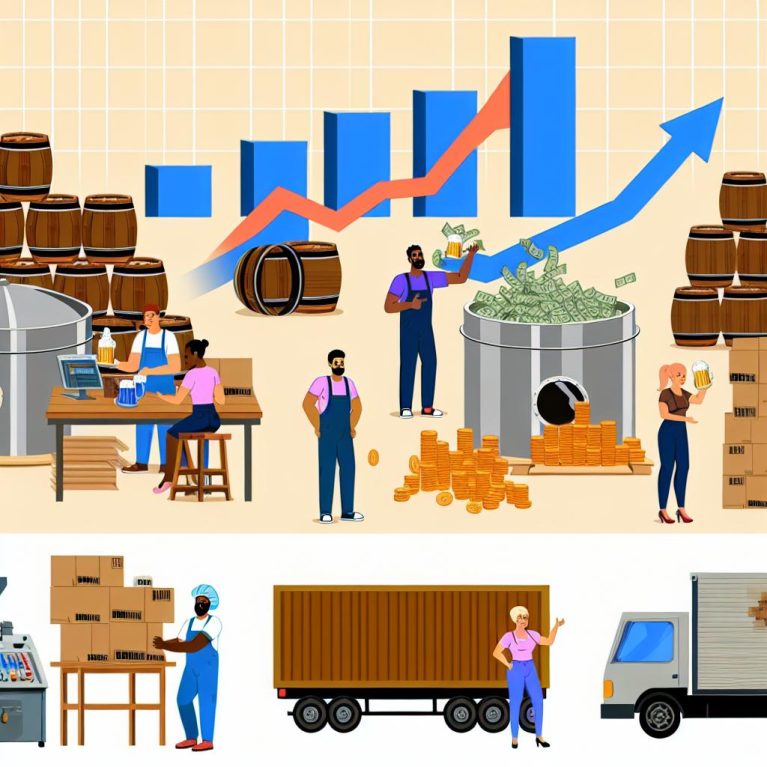The Economic Impact of the Craft Beer Industry
The craft beer industry has emerged as a significant player in the global economy, particularly in regions like North America and Europe. This burgeoning sector not only contributes to economic growth but also influences various facets of local and regional economies. Understanding the multifaceted impact of craft beer on the economy offers insights into how niche markets can stimulate widespread economic benefits.
Job Creation and Employment
One of the most direct economic impacts of the craft beer industry is job creation. Craft breweries require a diverse array of skills, employing individuals from brewmasters to sales and marketing professionals. According to recent data, the craft beer industry supports thousands of jobs worldwide. These positions often provide higher than average wages, contributing to better living standards in the communities where these breweries are located.
Craft beer enterprises often operate on a smaller scale compared to traditional breweries. This setup allows them to be agile and adaptable, creating unique employment opportunities. Employees in the craft beer sector include those involved in the brewing process, quality control specialists, logistics coordinators, and more. As the industry has continued to expand, so too has the need for skilled workers in specialized roles.
Benefits extend beyond just employment. Employees of craft breweries frequently report high levels of job satisfaction, often due to a more personalized workplace environment. This positive sentiment contributes to reduced turnover rates and increases the overall productivity of the sector. Moreover, higher remuneration and job satisfaction translate into increased consumer spending, thus boosting the local economy.
Supply Chain Influence
The craft beer industry’s impact extends beyond brewery walls. Breweries drive demand for a range of suppliers, including farmers, glass manufacturers, and transportation services. This intricate supply chain means that growth in the craft beer sector can have a ripple effect, positively impacting different areas of the economy.
Raw materials such as hops, malt, and yeast are sourced from local farms or specialized suppliers, promoting agricultural sectors in various regions. The increasing number of craft breweries leads to heightened demand for quality ingredients, often resulting in collaborative relationships between brewers and farmers. Such cooperation not only ensures a steady supply of raw materials but also supports ethical farming practices and sustainability.
Furthermore, the production and distribution of craft beer require packaging solutions, generating business for industries that produce bottles, cans, and kegs. The need for specialized equipment maintenance, logistics services, and marketing materials ensures that multiple sectors benefit from the supply chain affiliation with craft breweries.
Tourism and Local Economies
Craft beer has become an integral part of tourism strategies, attracting tourists to regions known for their brewing excellence. Beer tours and festivals have become popular attractions, infusing local economies with spending from both domestic and international visitors. This influx of visitors increases revenue for local businesses, including restaurants, hotels, and transportation services.
Cities known for their craft beer culture often see an uptick in economic activity due to beer-related tourism. Visitors participate in brewery tours, beer-tasting events, and festivals showcasing regional brewing talents. Such events not only enhance the cultural landscape of a destination but also promote cross-cultural exchanges.
Local businesses, from hospitality to retail, benefit from tourist expenditures. There is also a symbiotic relationship with regional tourism entities, who often market craft beer experiences as part of their visitations offerings. This strategic partnership boosts regional branding and reputation, attracting an even broader demographic of tourists.
Innovation and Entrepreneurship
The craft beer industry is also a hotbed for innovation and entrepreneurship. Breweries constantly experiment with flavors, brewing techniques, and sustainable practices. This innovation drives the industry’s growth and encourages new entrepreneurs to enter the market, fostering a culture of creativity and business dynamism.
Unique flavors and creative brewing methods distinguish craft beer from mass-produced alternatives. Brewers often take risks with novel ingredients or attempt traditional techniques revived with modern twists. This infusion of creativity enhances the appeal and diversity of craft beer, attracting aficionados eager to explore new tastes.
Sustainability initiatives within the craft beer industry reflect a growing awareness of environmental responsibilities. From reducing water use to repurposing waste products, breweries are exploring ways to lessen their environmental footprint. Such practices not only appeal to eco-conscious consumers but also set industry standards for responsible production.
Entrepreneurial ventures inspired by craft beer typically maintain a local focus. Entrepreneurs keen on entering the market often collaborate with existing businesses or establish new taprooms and breweries in areas seeking economic revitalization. This local emphasis fosters economic resilience and robust community ties.
Apart from these factors, craft breweries often engage in community activities and charities, enhancing their localities’ social fabric. By hosting fundraising events and participating in community outreach, breweries establish themselves as integral parts of their communities. These efforts foster goodwill and build lasting relationships with local citizens.
In conclusion, the craft beer industry significantly impacts economic growth through job creation, supply chain stimulation, tourism, and fostering innovation. Its role in shaping local economies is an exemplar of how niche industries can have widespread economic benefits. The collaborative ecosystem involving craft breweries and diverse sectors underscores the dynamic potential of inspired entrepreneurship within this arena.

